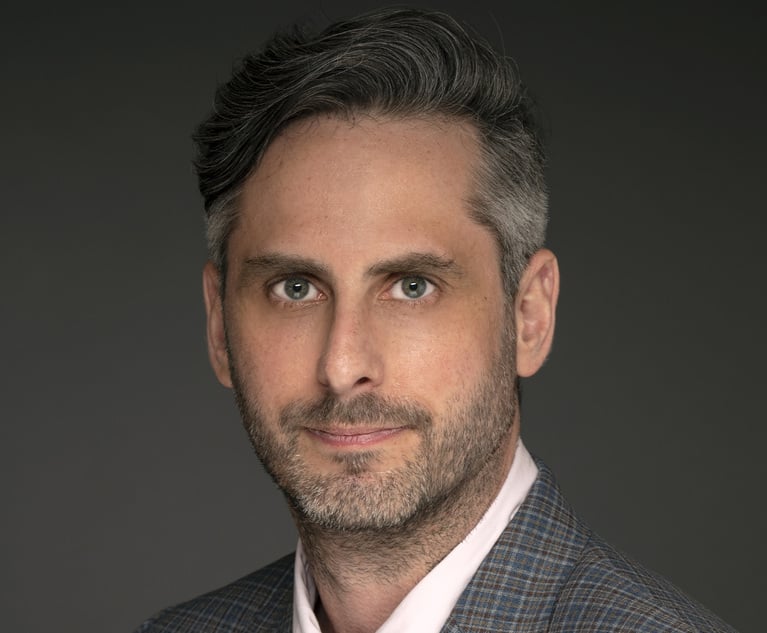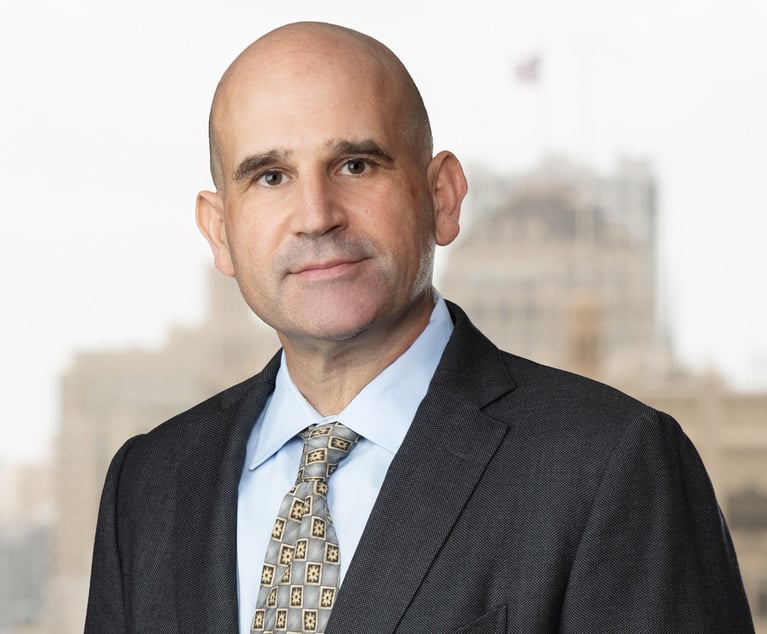 DNA mouth swab/courtesy photo
DNA mouth swab/courtesy photoIs California's DNA Retention a Violation of Privacy Rights?
EFF's Jamie Williams says there are laws that mandate the expungement of DNA collected from arrestees that are never convicted, though the process is far from simple. "If judges are relying on that to uphold the constitutionality of the law, it's really important we put some light onto what is actually happening," she says.
December 26, 2018 at 12:00 PM
7 minute read
A new privacy battle is shaping up over DNA retention, and California is the battleground.
That's after a group of social justice organizations brought suit over the state's “failure to automatically expunge” genetic information collected from individuals who are arrested but never convicted of a crime.
To decode the case and its implications, The Recorder touched base with Jamie Williams, one of the Electronic Frontier Foundation attorneys representing the plaintiffs in the suit. In her opinion, the state's effort is a direct violation of privacy rights, as well as a misuse of taxpayer dollars.
(You can get a glimpse of the plaintiffs' entire argument here. A representative for the California Attorney General's Office, which is defending the suit, declined to comment.)
Here's a condensed version of our conversation with Williams, edited for length and clarity.
 Jamie Williams of Electronic Frontier Foundation/courtesy photo
Jamie Williams of Electronic Frontier Foundation/courtesy photo
The Recorder: What are the implications of this sort of DNA collection and retention, and what do you hope to achieve with this lawsuit?
JW: The whole point of [California's DNA collection and retention] law was to get people who were arrested and charged with crimes, but once you weren't convicted or you were proven innocent, the state doesn't have any interest in keeping your DNA any longer. Because of the overpolicing and inherent bias in the criminal justice system, these policies negatively impact minorities more than other people.
Only a fraction of the people who have been eligible to have their profiles expunged actually have their profiles expunged. So there are all these innocent people, and a great percentage of them are going to be people of color, and the state is just collecting this database of genetic material about these people and negatively impacting these communities more than others.
This has some really long-term implications. Who knows what uses DNA [will have] down the line. Technology is constantly developing, and they still have all the samples—it's not just the one single profile. They have their genetic material as well.
So the purpose of the law is to collect from arrestees but expunge the DNA if they're acquitted?
The law provides if you're not convicted and there's not been other situations, you could have your DNA expunged. It acknowledges [law enforcement] doesn't have an interest. This is about collecting DNA from people who are arrested to help identify people and help in the course of an investigation. but after that investigation is over, the law itself contemplates they don't need this DNA. They shouldn't be keeping it.
Since we filed this litigation, we've already had multiple people contact the attorneys involved in the case to say, “Hey, this happened to me.” And some of them weren't even charged with a felony. So who knows if they were even arrested for one? The actual, on-the-ground implications of this may be larger than we think because DNA is being collected from people without them understanding their rights. No one knows who to contact. We don't actually know what's going on. And it seems just from the context we've had over the past couple of days, this is expansive abuse. And especially not telling people about their rights after taking people's sensitive genetic material and sending them off acting like there's nothing they can do.
Because the law requires you contact the state to remove the information. And as your complaint states, only about 1 percent of people affected do this?
In some cases, you have to contact the prosecutor to get a letter. In others, you have to contact the court to show it was a misdemeanor charge. These are complicated things. Even for a lawyer it's a pain in the butt to get a prosecutor to respond. And we're talking about people who are not necessarily lawyers. The burden is just way too high, especially when you're not even telling people this is a right that they have.
How does this lawsuit stack in relation to different legal actions against DNA collection or retention?
There are federal laws that mandate there be [an] expungement process for CODIS [the federal DNA database used by California]. It's definitely an issue that's been coming up all over the place. This is [about] 10 years now since all the litigation started when arrestee DNA collection laws first started coming out. It makes sense that would be coming up in a bunch of different cases now.
A lot of the times, [the expungement process] was one of the justifications for the law. In court it was like look, if they're not convicted, it's going to be expunged. But is that really happening? No, it's not. And if judges are relying on that to uphold the constitutionality of the law, it's really important we put some light onto what is actually happening.
So it's denying arrestees of their rights?
Yeah. By not telling them. [Expungement is] very complicated and it shouldn't be.
We want the state to automatically expunge [the genetic information of] people. It has the ability to do that. It recently passed a law this year involving DNA collection from minors. If a juvenile hasn't been implicated in a felony case in two years, that mandates automatic expungement. So it's possible. The state should be doing it. It isn't that hard. If they have the ability to collect all this DNA from people, then they should have the ability to do something that expunges it automatically. Because it's not going to happen otherwise.
How does the legal strategy you're pursuing—Article I searches and seizures, privacy rights, retention not collection—line up against others in similar suits?
In California, the collection has already been challenged. Both EFF and Michael Risher back at the ACLU were involved in those cases. Risher was lead counsel in Haskell v. Harris, the federal challenge, and then filed an amicus brief for the ACLU [in another case]. And I worked on that case back when I was at a law firm.
So we've all kind of been there tried that, and in the Supreme Court's decision in Maryland v. King, which we don't think is a great decision, but it kind of necessitates looking at it in a different angle.
So is this novel then?
Again, in those cases it was justified by expungement. That's one of the reasons the government made in those cases. In California and Maryland v. King, it came up as well. So I think this is the logical next step. You said you were going to do this, you said it was OK, and it's not working. It's not doing what they're saying it's doing, and that's a violation of people's rights. They themselves harped on this issue and then didn't live up to that. If courts say they need to collect it, fine, but there need to be limitations on it, and right now there's not. So let's enforce limitations and people's rights once they have not been convicted and charges have been dropped.
This content has been archived. It is available through our partners, LexisNexis® and Bloomberg Law.
To view this content, please continue to their sites.
Not a Lexis Subscriber?
Subscribe Now
Not a Bloomberg Law Subscriber?
Subscribe Now
NOT FOR REPRINT
© 2024 ALM Global, LLC, All Rights Reserved. Request academic re-use from www.copyright.com. All other uses, submit a request to [email protected]. For more information visit Asset & Logo Licensing.
You Might Like
View All
How the Deal Got Done: Sidley Austin and NWSL Angel City Football Club/Iger

How Uncertainty in College Athletics Compensation Could Drive Lawsuits in 2025

How I Made Practice Group Chair: 'Think About Why You Want the Role, Because It Is Not an Easy Job,' Says Aaron Rubin of Morrison Foerster

Outgoing USPTO Director Kathi Vidal: ‘We All Want the Country to Be in a Better Place’
19 minute readTrending Stories
Who Got The Work
Michael G. Bongiorno, Andrew Scott Dulberg and Elizabeth E. Driscoll from Wilmer Cutler Pickering Hale and Dorr have stepped in to represent Symbotic Inc., an A.I.-enabled technology platform that focuses on increasing supply chain efficiency, and other defendants in a pending shareholder derivative lawsuit. The case, filed Oct. 2 in Massachusetts District Court by the Brown Law Firm on behalf of Stephen Austen, accuses certain officers and directors of misleading investors in regard to Symbotic's potential for margin growth by failing to disclose that the company was not equipped to timely deploy its systems or manage expenses through project delays. The case, assigned to U.S. District Judge Nathaniel M. Gorton, is 1:24-cv-12522, Austen v. Cohen et al.
Who Got The Work
Edmund Polubinski and Marie Killmond of Davis Polk & Wardwell have entered appearances for data platform software development company MongoDB and other defendants in a pending shareholder derivative lawsuit. The action, filed Oct. 7 in New York Southern District Court by the Brown Law Firm, accuses the company's directors and/or officers of falsely expressing confidence in the company’s restructuring of its sales incentive plan and downplaying the severity of decreases in its upfront commitments. The case is 1:24-cv-07594, Roy v. Ittycheria et al.
Who Got The Work
Amy O. Bruchs and Kurt F. Ellison of Michael Best & Friedrich have entered appearances for Epic Systems Corp. in a pending employment discrimination lawsuit. The suit was filed Sept. 7 in Wisconsin Western District Court by Levine Eisberner LLC and Siri & Glimstad on behalf of a project manager who claims that he was wrongfully terminated after applying for a religious exemption to the defendant's COVID-19 vaccine mandate. The case, assigned to U.S. Magistrate Judge Anita Marie Boor, is 3:24-cv-00630, Secker, Nathan v. Epic Systems Corporation.
Who Got The Work
David X. Sullivan, Thomas J. Finn and Gregory A. Hall from McCarter & English have entered appearances for Sunrun Installation Services in a pending civil rights lawsuit. The complaint was filed Sept. 4 in Connecticut District Court by attorney Robert M. Berke on behalf of former employee George Edward Steins, who was arrested and charged with employing an unregistered home improvement salesperson. The complaint alleges that had Sunrun informed the Connecticut Department of Consumer Protection that the plaintiff's employment had ended in 2017 and that he no longer held Sunrun's home improvement contractor license, he would not have been hit with charges, which were dismissed in May 2024. The case, assigned to U.S. District Judge Jeffrey A. Meyer, is 3:24-cv-01423, Steins v. Sunrun, Inc. et al.
Who Got The Work
Greenberg Traurig shareholder Joshua L. Raskin has entered an appearance for boohoo.com UK Ltd. in a pending patent infringement lawsuit. The suit, filed Sept. 3 in Texas Eastern District Court by Rozier Hardt McDonough on behalf of Alto Dynamics, asserts five patents related to an online shopping platform. The case, assigned to U.S. District Judge Rodney Gilstrap, is 2:24-cv-00719, Alto Dynamics, LLC v. boohoo.com UK Limited.
Featured Firms
Law Offices of Gary Martin Hays & Associates, P.C.
(470) 294-1674
Law Offices of Mark E. Salomone
(857) 444-6468
Smith & Hassler
(713) 739-1250






